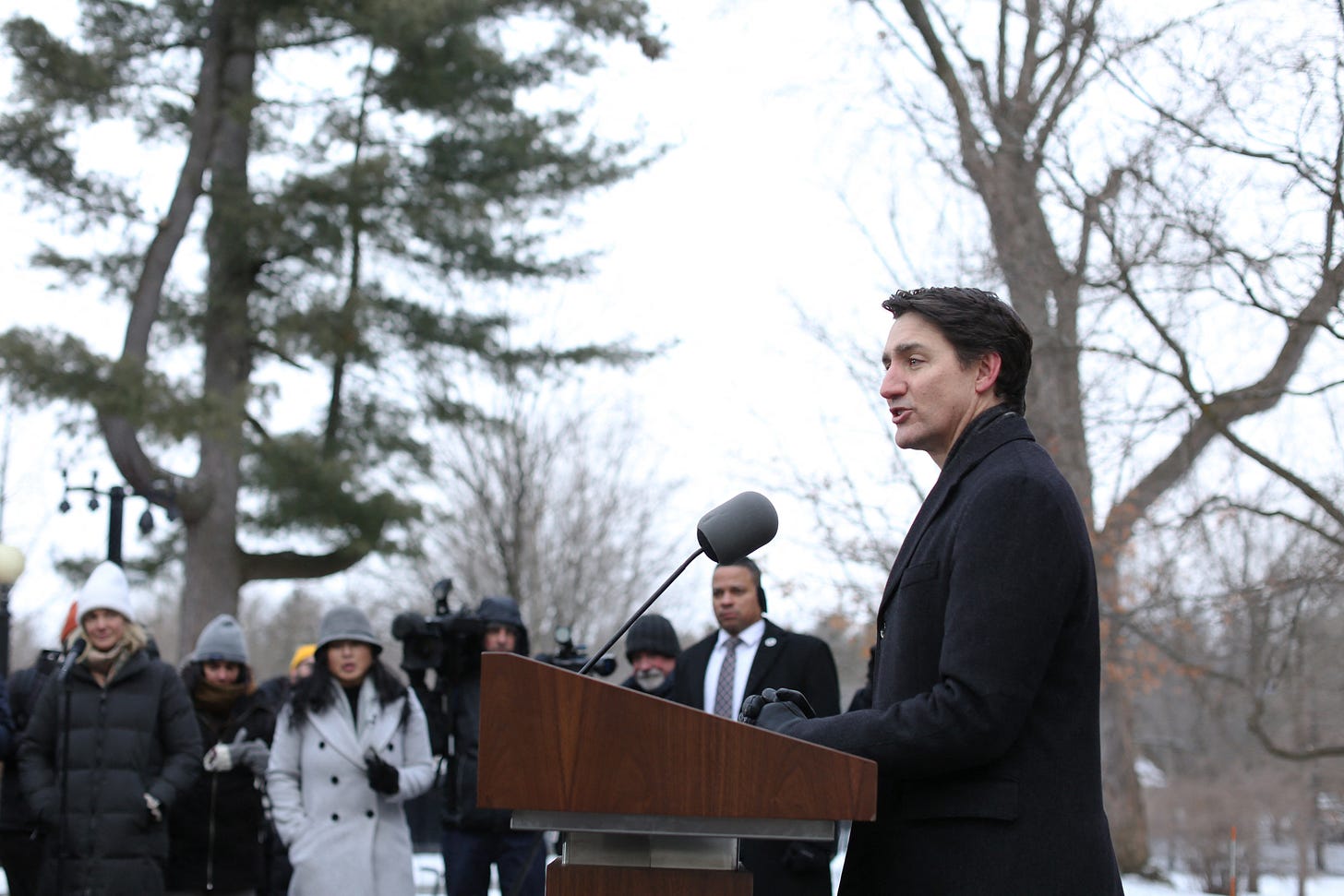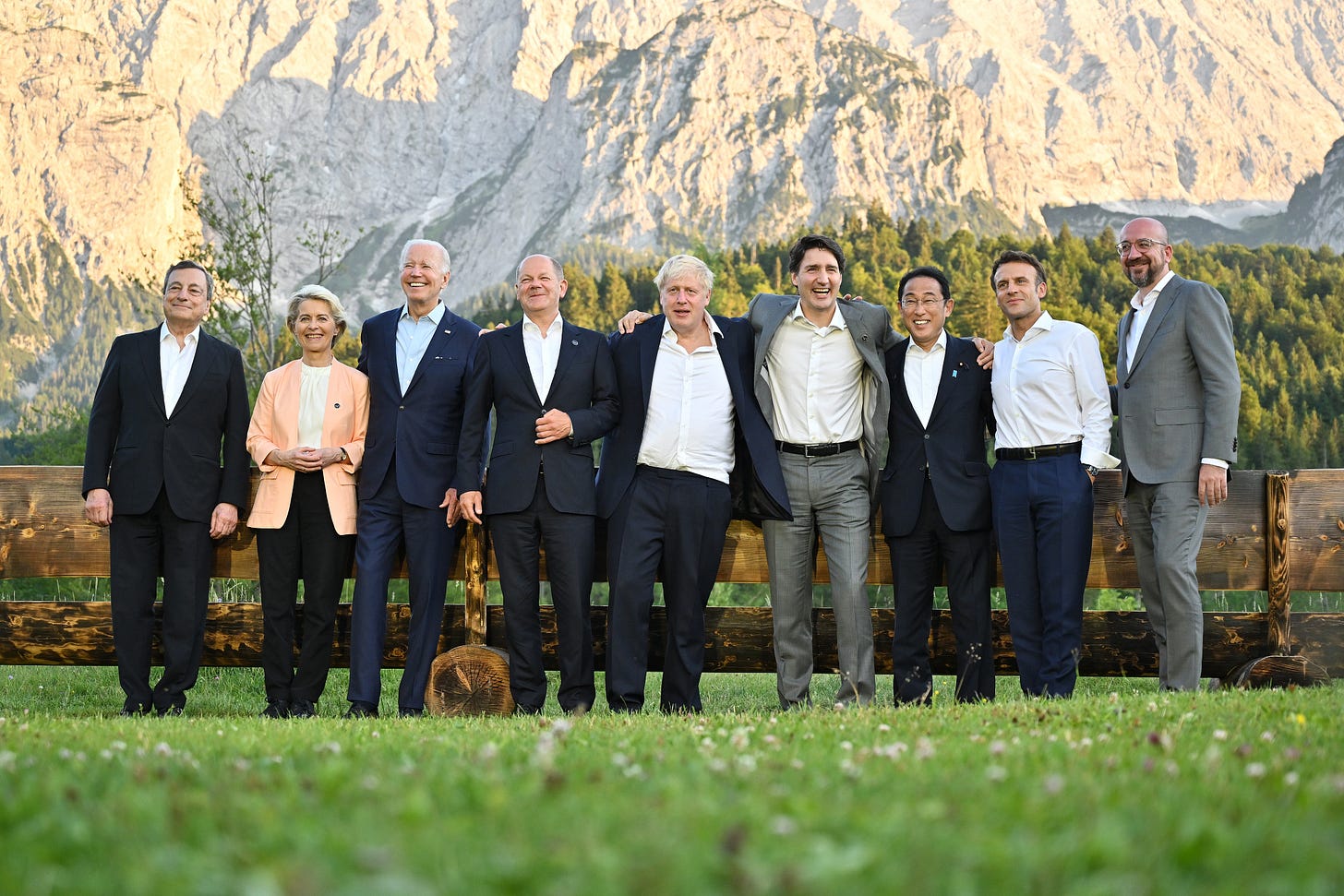Trud'oh!
Another Covid-era leader bites the dust. It's been a long time coming.

By the time Justin Trudeau announced his resignation as Liberal Party leader and Canadian prime minister, it was hard to find anyone with a nice thing to say about him. When his closest ally and finance minister Chrystia Freeland—really a sort of co-prime minister—walked off in a huff last month accusing him of putting “gimmicks” in place of government and being unfit to stand up to Trump’s threats of a trade war, the writing was on the wall. The Trudeau era was over, and everyone except Justin Trudeau seemed to have gotten the memo.
It’s not that he’d been hit by some scandal, or that he’d made some gigantic, attention-grabbing blunder; it’s just that he’d outstayed his welcome. The initial flush of optimism and star power that greeted him when he took office almost 10 years ago had long since faded amid a drip-drip-drip of subtly botched decisions that, little by little, mired the country in problems that seemed like they would be manageable, if only someone would take the trouble to manage them.
Some of it wasn’t his fault, some of it was. Canada suffered the same bout of Covid-era inflation everywhere else did, but seemed to manage it worse than most. A surge of immigrant arrivals hit the country just as new housing construction was lagging, leading to a spike in housing costs that Canadians blamed the prime minister personally for.
More than anything else, it was this housing crunch that soured the country on Trudeau. In Montreal, where I spent most of the last decade, housing went from easily affordable to distressingly out-of-reach, while the government twiddled its thumbs, promising first time home buyers tax credits that would only juice demand and make the problem worse.
Throughout this crisis and others, Trudeau stuck to the kind of woke orthodoxy that voters all around the world never much liked to begin with, and turned deeply sour on after the pandemic. He ordered the flags on federal buildings to be lowered for months in light of widespread (and as far as we know, false) claims that a mass grave containing the bodies of hundreds of indigenous children had been discovered on the grounds of a Catholic residential school. Delivering on the green movement’s most urgent policy priority, he passed a carbon tax that Canadians soon grew to loathe. Carbon tax rates rose as Covid-era inflation was still pressing people’s finances.
The Conservative opposition saw its opening and, to its credit, moved fast, making “Axe the Tax” a rallying cry. On housing, they put together an aggressive set of build-baby-build policies centered on juicing supply by doing away with veto points on new housing construction. It’s a broadly popular agenda with a libertarian edge, and in the hands of their sharp-elbowed but charismatic new leader, is set to give them a big parliamentary majority, if polls are to be believed.
That new leader, Pierre Poilievre, is now almost certain to be Canada’s next prime minister. He’s a wholly new kind of politician for Canada: fully at ease in a social media world, combatively anti-woke and unafraid to offend, he’s far from the stylistic centrism of any of his predecessors. Poilievre is much closer to Donald Trump in sensibilities than Trudeau ever was, but he will face an American administration apparently determined to impose the kinds of crippling tariffs that would derail any Canadian government’s agenda. Can he somehow talk Donald Trump out of it? Canadians can’t wait to find out.
Out of the original batch of Covid-era G7 leaders, Trudeau was the last man standing. Looking through photos of the summit in Germany in 2022 gives you a peek into an era that already feels long past, even before it’s quite over.
Everybody is either gone or a lame duck. Boris Johnson is a distant memory fading in the rear-view mirror of history, Mario Draghi got drubbed by the far right in Italy, Fumio Kishida bowed out amid a swirl of scandals in Japan. Of the lame ducks, Emanuel Macron called a needless election and got hammered, Olaf Scholz’s coalition collapsed, and we all know what happened to poor old Joe Biden. Only Trudeau hung on, just, through the start of 2025—a dead man walking amid a political era that had passed him by.
In the end, Justin Trudeau will be remembered mostly for legalizing cannabis, allowing medically-assisted suicide with distressingly few safeguards, and pushing for ever harsher punishment for speech that results in hazily defined “online harm.” The bright new woke future Trudeau once seemed to stand for came, and people didn’t like it all that much. As he slinks off into the netherworld of the politically defeated, the politics he stood for already feels like an anachronism.
Quico Toro is a contributing editor at Persuasion and writes the Substack One Percent Brighter.
Follow Persuasion on X, LinkedIn, and YouTube to keep up with our latest articles, podcasts, and events, as well as updates from excellent writers across our network.
And, to receive pieces like this in your inbox and support our work, subscribe below:




He really was a big disappointment. As someone who can't stand Poilievre from his days as chief toady in the Harper government (prior to Trudeau), I am at the point where the center left needs a total and complete drubbing so they can rebuild as something serious instead of the aspirational nonsense the current incarnation is in. The NDP (*technically* left of the current Liberals) also need a complete wipeout. It will be interesting to see if Poilievre, unlike Trudeau and Harper will actually delegate and decenter power to his caucus or rule like the smug geniuses Harper and Trudeau thought they were.... So good luck Poilievre and (hopefully) team. Lets see if they have more in them than just meme and (very justified) ridicule... Its always easy to take the high road when not in power.
Hey, Quico. Please read A Theory of Everything by Ken Wilber. (Disponible en Espanol)